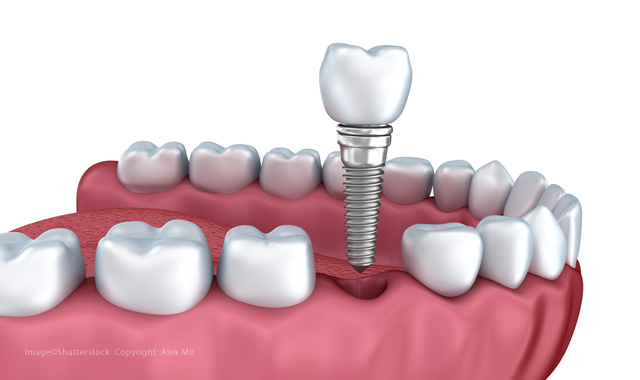New coating could make dental implants better than ever
A team of researchers out of UPV/EHU-University of Basque Country have developed a coating for implants that could help stop infections.

Infection is often cited as the main reason that most implants fail. If the risk of infection could be reduced, or even removed altogether, implant success would be much more likely.
To accomplish this, a team of researchers at the UPV/EHU-University of Basque Country has developed implant coatings. The study, “Control of the degradation of silica sol-gel hybrid coatings for metal implants prepared by the triple combination of alkoxysilanes” was published in the Journal of Non-Crystalline solids.
The coatings are not only able to prevent bacterial infection from occurring, but can also eliminate infection if it does occur. The coatings also have osseointegrating properties, which give greater strength to the implant.
Beatriz Palla, a researcher in the Biomaterials Group of the UPV/EHU's Department of Polymer Science and Technology, explains that finding a surface capable of preventing bacterial growth "is a subject of undoubted interest, borne out by the huge number of publications that have been developed in this field," adding that “about 10 percent of implants have to be removed due to osseointegration problems or to the onset of infections.”
Read more: New study finds troubling rates of dental implant compllications
The difficulty of producing a material capable of combatting those risks is mainly due to the resilience of bacteria. As bacteria become more and more resitant to antibacterial products, it becomes increasingly difficult to find a material capable of defeating them. It is also important to note the difficultly of trying to provide a coating for titanium implants.
Says Palla, “We had already obtained coatings that facilitate the generating of bone around the implant and thus facilitate anchoring to the bone. In a bid to go a step further, we looked at how to turn these coatings into bactericides."
Related article: Oral bacteria linked to risk of pancreatic cancer
To accomplish this, the team turned to sol-gel synthesis. Sol-gel synthesis relies on the preparation of a precursor solution, sol, that forms a gel. This gel can then be used to coat the surface of the titanium screw. The screw undergoes a heat treatment, which bonds the gel to the implanting screw. "We used silica as the precursor, because in many studies this compound has been shown to be osteoinductive, so it facilitates one of the objectives we wanted to achieve. What is more, to provide the materials with antibacterial characteristics, we added various antibacterial agents" says Palla.
Three prototypes for the coating were developed in the study. Each had a different method of dealing with bacteria-either prophylactically by preventing the bacteria from becoming adhered initially and the subsequent infection or by eliminating it once it has developed-before a solid method was discovered.
The coating chosen "is designed to be used in situ, at the dentist's surgery itself, on the infected screw without any need to extract the implant from the patient. This new material is in the process of being patented and remains a trade secret," says Palla.
Related article: Common oral bacteria could treat troublesome illness
Palla believes that “it is possible to confirm that coatings with an antibacterial capability and which do not affect the proper integration of the implant into the jawbone have been developed." However, she does admit that the design is far from being market ready. "Apart from all the trials that remain to be carried out, it would also be advisable to pursue the research a little further to optimize the results more."
Episode 31: Dentsply Sirona Implant Announcements
September 30th 2021DPR’s Editorial Director Noah Levine sat down with Gene Dorff, Dentsply Sirona’s group vice president of implants and Dr. Dan Butterman to review several big announcements the company made in the arena of implants during Dentsply Sirona World 2021 in Las Vegas.